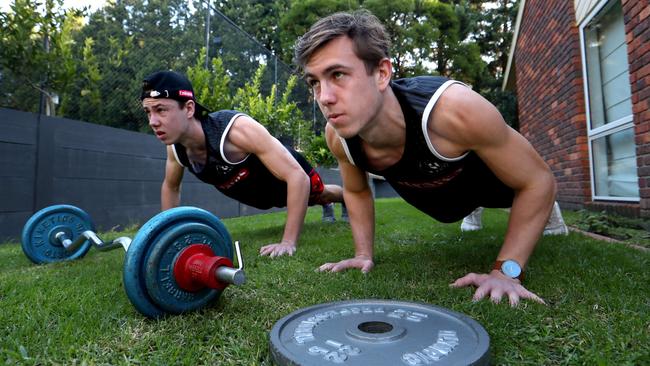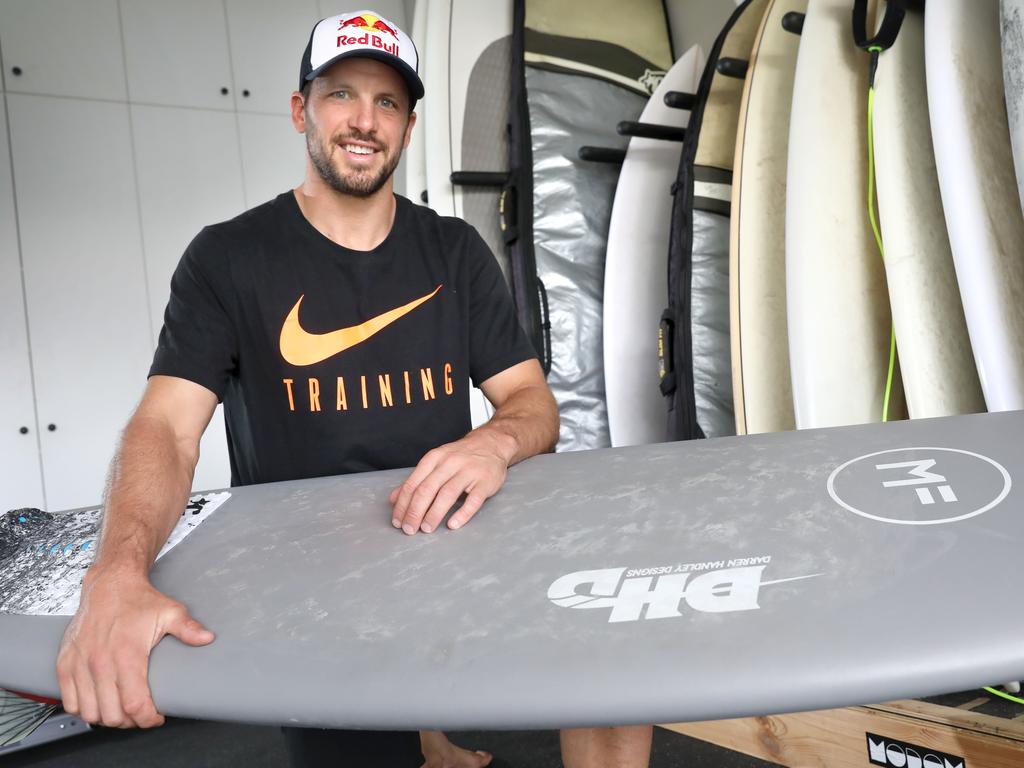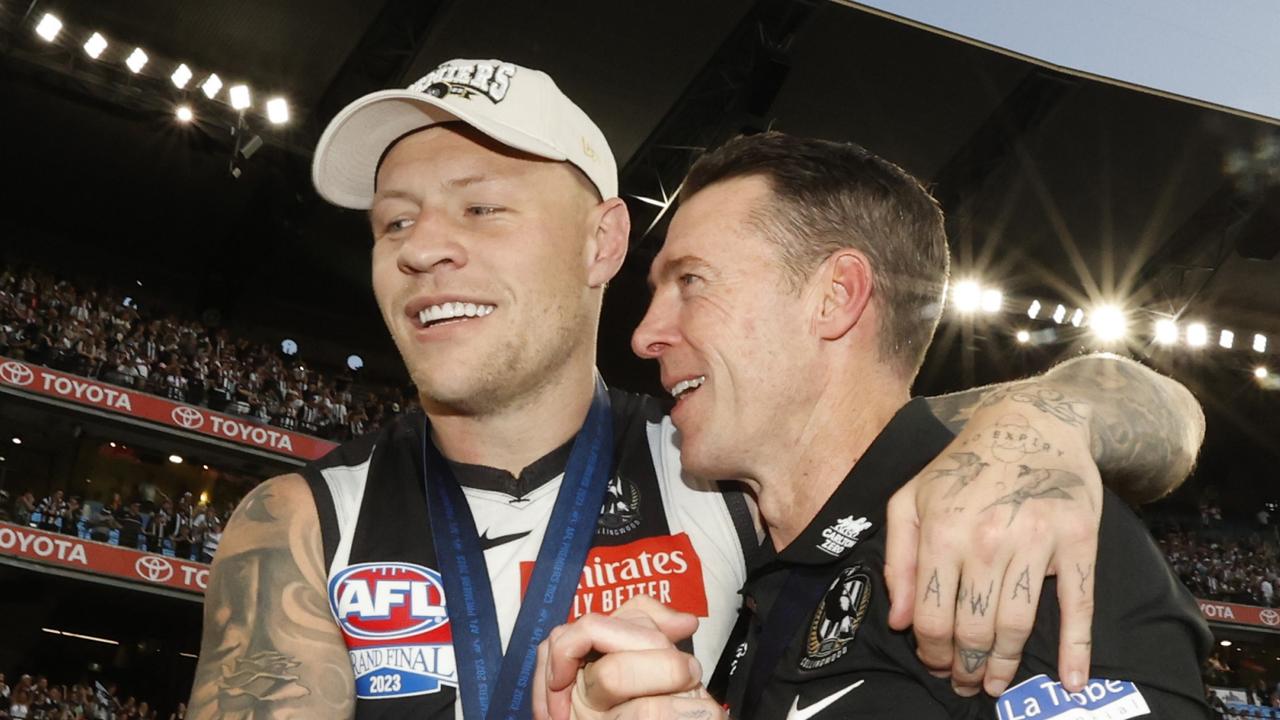AFL’s experiment with the best of enemies
Port Adelaide and the Crows will relocate to the Gold Coast by Monday to begin an experiment crucial to the future of the AFL.

Port Adelaide and the Crows will relocate to the Gold Coast by Monday to begin an extraordinary experiment crucial to the future of the AFL.
With the AFL aiming to restart on June 11, West Coast and Fremantle will join the Adelaide teams in southeast Queensland a fortnight later at a separate resort.
The coronavirus crisis has crippled the code financially. But it will also manage the remarkable by joining the fiercest of enemies together in a common goal.
The derbies between the Eagles and Dockers, along with the showdowns between Adelaide and the Power, have produced some of the most brutal contests the AFL has seen.
The enmity between the clubs and some of their fans is real and prolonged. But for at least a month and perhaps for longer, the clubs will coexist in a forced truce on the Gold Coast. Their flights across the nation are likely to be shared. The Eagles and Dockers will then live side-by-side at The Royal Pines Resort, while the Crows and Power share The Mercure.
Due to a concession from the AFL that guaranteed the four clubs would agree to the relocation, families will also be welcomed in the hubs at the league’s expense.
Future father-son and father-daughter recruits could be tumbling around in pools and kicking footies between each other as their dads prepare for the restart in four weeks.
Just under two months after AFL chief executive Gillon McLachlan suspended the season, he announced on Friday that training will resume on Monday with a restart on June 11, possibly between Richmond and Collingwood at the MCG. “This is an exciting day for our clubs and our supporters … but the return to footy doesn’t mean the work is complete,” McLachlan said.
On Friday, footballers such as Collingwood father-son recruits Callum and Tyler Brown were training in pairs around the country. But from Monday they will begin returning to their clubs, initially to train in groups of eight without contact in order to comply with the regulations of governments around the country.
Full contact training will then begin on May 25, the date Western Australia has provided an exemption to the Eagles and Dockers, which will give clubs almost three weeks to be properly prepared for the opening four weeks of the season.
Matches will be played on the Gold Coast and in Brisbane, along with Melbourne and Sydney initially. It is hoped quarantine and border restrictions will ease by July to allow the clubs to return to their home states and for games to be played in Adelaide and Perth.
Should this occur, charter flights will then be used to play out the remainder of the season. The finals series will run over the usual four-week schedule, with the grand final to be played on October 24 if all goes to plan.
The AFL is contractually obliged to hold the decider in Victoria and, barring a significant disruption, it will be held at either the MCG or Marvel Stadium.
The league is set to release a fixture for the first four rounds by next Monday.
It will adopt a floating fixture for the remainder of the season, partly to allow it the room to deal with a crisis if needed, but also to give it the flexibility to schedule blockbuster matches for key broadcast times to maximise viewing audiences each week.
Strict guidelines will be implemented in a bid to protect the code and the general public from spreading COVID-19 throughout the 17-round season.
McLachlan said he had significant fears when the season was suspended on March 22 that it would not be possible to restart it.
He conceded it is possible there will be further “lumps and bumps” given the highly contagious nature of the virus and the prospect it may yet flare again through winter. But the AFL’s protocols will see players live under harsher measures than the rest of the community throughout the season.
Players will undergo COVID-19 tests twice a week for the rest of the season and have temperature checks daily.
There will also be strict rules regarding who can visit the homes of players based in Melbourne and Sydney through the initial stages, and also in Adelaide and Perth should the health outlook improve enough for the relocated clubs to return home.
The AFL will begin a series of compliance checks on the homes of players in coming weeks, which is a similar process to that being used by the NRL ahead of the season relaunch on May 28.
The AFL Players Association doubts any players will be forced to move to new accommodation, but it is possible should the risk be deemed too great.
New laws have also been enshrined in the AFL laws in order to allow players to be punished should a breach of COVID-19 protocols occur. The AFL was furious with the Adelaide Crows for a breach of guidelines in the Barossa Valley last week, while Western Bulldogs star Lachie Hunter was another offender.







To join the conversation, please log in. Don't have an account? Register
Join the conversation, you are commenting as Logout